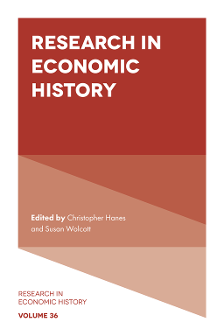
Prelims
ISBN: 978-1-83909-180-3, eISBN: 978-1-83909-179-7
ISSN: 0363-3268
Publication date: 30 September 2020
Citation
(2020), "Prelims", Hanes, C. and Wolcott, S. (Ed.) Research in Economic History (Research in Economic History, Vol. 36), Emerald Publishing Limited, Leeds, pp. i-x. https://doi.org/10.1108/S0363-326820200000036007
Publisher
:Emerald Publishing Limited
Copyright © 2020 Emerald Publishing Limited
Half Title Page
Research in Economic History
Series Title Page
Research in Economic History, Volume 36
Series Editors: Christopher Hanes and Susan Wolcott
Title Page
Research in Economic History Volume 36
Research in Economic History
Edited by
Christopher Hanes
SUNY Binghamton, USA
Susan Wolcott
SUNY Binghamton, USA

United Kingdom – North America – Japan India – Malaysia – China
Copyright Page
Emerald Publishing Limited
Howard House, Wagon Lane, Bingley BD16 1WA, UK
First edition 2020
Copyright © 2020 Emerald Publishing Limited
Reprints and permissions service
Contact: permissions@emeraldinsight.com
No part of this book may be reproduced, stored in a retrieval system, transmitted in any form or by any means electronic, mechanical, photocopying, recording or otherwise without either the prior written permission of the publisher or a licence permitting restricted copying issued in the UK by The Copyright Licensing Agency and in the USA by The Copyright Clearance Center. Any opinions expressed in the chapters are those of the authors. Whilst Emerald makes every effort to ensure the quality and accuracy of its content, Emerald makes no representation implied or otherwise, as to the chapters' suitability and application and disclaims any warranties, express or implied, to their use.
British Library Cataloguing in Publication Data
A catalogue record for this book is available from the British Library
ISBN: 978-1-83909-180-3 (Print)
ISBN: 978-1-83909-179-7 (Online)
ISBN: 978-1-83909-181-0 (Epub)
ISSN: 0363-3268 (Series)


List of Contributors
| Léo Charles | University Rennes, France |
| Dmitry V. Didenko | Russian Presidential Academy of National Economy and Public Administration, Russia |
| Gregori Galofré-Vilà | Universitat Pompeu Fabra, Spain |
| Vincent Geloso | King's University College, Canada |
| Michael Hinton | Rimini Centre For Economic Analysis, Wilfrid Laurier University, Canada |
| Linda M. Hooks | Williams School of Commerce, Economics and Politics, Washington and Lee University, USA |
| Lawrence H. Officer | University of Chicago, USA |
| Samuel H. Williamson | Miami University, USA |
Introduction
Research in Economic History is a refereed journal, specializing in economic history, in the form of a book. We publish articles that follow the standard formats of economics journals, but we can also accommodate longer pieces, historical narratives and articles that primarily present newly constructed datasets.
In this volume, Charles reports on his work transcribing and analyzing the handwritten records of Swiss trade statistics between 1885 and 1913. He uses his newly constructed dataset to compute several measures which identify the sources of comparative advantage of the Swiss economy, and compares those measures to similar measures for France. Surprisingly, he finds that the goods exported by the Swiss were similar to those exported by the much larger French economy. However, the Swiss economy showed itself to be more flexible in terms of export industries over the period.
Didenko also reports on a dataset, in this case it is an extension of a dataset previously made available. His goal is to understand the sources of finance for investments in human capital in Russia from the late imperial period through to the modern day. His research supports the arguments of Gerschenkron that the government of late industrializers compensated for the lack of capital and infrastructure by direct investments.
Galofre-Vila's article is an unusual one for our journal. It is a study of the discipline of economic history itself – real-time history of economic thought. He creates a database of articles published in major economic history journals from 1980 to 2018. He performs a network analysis that shows how scholars were interconnected. He reveals changes over the decades in the subjects of economic history research, and the countries and universities in which that research has been carried out.
Geloso and Hinton construct a consumer price index for Canada 1870–1900 which includes goods (clothing and household furnishings) omitted from existing indices. The improved price index implies a much more rapid rate of growth in Canadian real incomes over that period than found by earlier studies. This is an important contribution to Canadian economic history which should change views of the country's development and role in the North Atlantic economy.
Hooks examines an aspect of the development of America's peculiar “dual” banking system, that is the existence of “national” banks, chartered and regulated by a federal authority, operating alongside banks chartered and regulated by state authorities. Oddly, Texas did not allow state banks until 1904, when a proposal for a state bank system was passed by plebiscite. Hooks analyzes the relationship between the votes for the new system in a county with the county's demographic and economic characteristics and the degree to which the county was already served by national banks. Her analysis helps explain why Texas was so slow to adopt state banking, and why it finally did.
Officer and Williamson construct data on numbers and value of slaves imported to the US over 1790–1860. They estimate the effect of the international slave trade on the US balance of international payments and conclude among other things, that federal and state laws prohibiting the slave trade were effective.
- Prelims
- Specializations in Switzerland in the Nineteenth Century: Evolution of Trade Patterns and Growth Model
- Trends and Institutional Sources of Financing Russia's Human Capital Formation (Late Nineteenth–Early Twenty-first Centuries)
- The Past's Long Shadow: A Systematic Review and Network Analysis of Economic History
- Improving Deflators for Estimating Canadian Economic Growth, 1870–1900
- The Political Economy of State-chartered Banks in Early Twentieth-century Texas
- The Antebellum Slave Trade: Numbers and Impact on the Balance of Payments